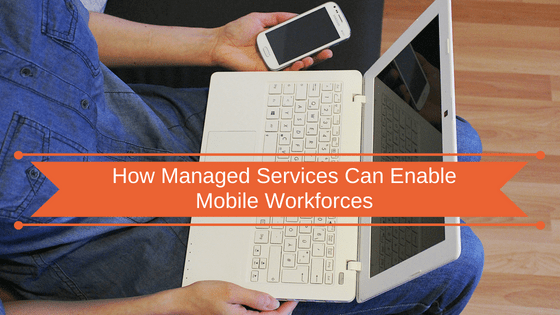Once upon a time, the idea of a workforce based at home was absurd. However, the advent of collaborative technologies — combined with a higher overall technical bar for today’s average worker — have allowed mobile workforces to flourish.
Today, remote team members are nearly as common as those working from co-located offices. In fact, around 50% of American workers telecommute at least part of the time. But those numbers would be higher if workers had their way. Between 80 and 90% of workers surveyed say they would work from home part time if they were permitted to, which means that mobility is a big hit with team members.
Businesses have technology to thank for this shift in the worker mindset. But implementing and maintaining the technical tools that make remote work possible may be more than your current IT team can handle. Managed services providers (MSPs) are able to provide consistent, reliable support for current IT services while integrating security provisions and data protections to keep online assets safe. And they can help your team implement tools that make communication and workflow management simpler and more efficient. Here’s how managed services can help your business achieve harmony on the new mobile frontier.
Securing Cloud Assets and Services
The cloud has undoubtedly been the stepping stone to more agile, mobile teams. Cloud databases provide a central repository for shared information, while cloud applications can fulfill just about any function you could ask for, making collaboration simple and efficient.
However, data on the cloud is at increased risk for misuse. Any time information travels back and forth, it can be intercepted by hackers and other threat actors to be used for malicious purposes. And hackers are certainly aware of these vulnerabilities. Popular cloud services witness thousands — if not millions — of attempted data breaches per day.
The convenience that makes the cloud so integral to mobility also comes with additional security challenges. If data can be accessed anywhere, from anytime, then there are fewer physical controls keeping your assets in the right place. Many of the security concerns that plagued the public cloud in its earliest iterations have been shored up by tighter data center controls; however, users themselves often introduce vulnerabilities when they fail to properly structure repositories and other cloud-based tools.
An MSP provides assistance along two fronts: securely configuring cloud services while implementing additional controls to monitor and protect assets in the event of a data breach or other cybercrime. Allowing a professional managed services provider to oversee these protections helps your team achieve maximum mobility with fewer obstacles to security.
Building More Efficient Workflows and Teams
Many businesses enable mobile work-forces as a way to save: converting to remote teams saves $11,000 per remote worker per year. Enacting a bring-your-own-device policy can initiate further savings and gives team members the flexibility they need to choose the tech that works best for them.
However, there are additional ways to save when you hire an MSP to manage your business technology. Outsourcing IT tasks and vendor management to a managed services provider results in significant cost savings. Many businesses find that they can reduce or eliminate internal IT roles and receive a higher level of service in exchange for lower overhead. Mobile workers, meanwhile, have a support number they can call for technical assistance, without diverting your resources away from other technical projects and initiatives.
All in all, that means more efficient workflows in which employees are free to focus on core competencies. MSPs may also help identify tools and products that can limit redundant work or increase efficiency. Most managed services providers have a consulting mechanism through which they offer advice and recommendations to streamline IT tools and services so you can continue to adapt your IT as your business grows.
Designing Effective, Professional Communications Systems
Effective, productive communication is the top requirement for any distributed workforce. A reliable managed services provider should be able to provide your business with optimal solutions to handle these types of mobility challenges, regardless of where your team is located.
A VoIP unified communications system, for instance, can maintain the appearance of a centralized location or main office while allowing team members to manage sales and service calls from their laptops or smartphones. For many businesses, this means they can extend their service hours by handling customer communication across multiple time zones. With a VoIP system, every call appears as though it is originating at your business’s main branch rather than from a personal phone number.
Unified communications systems also provide a single platform from which employees can manage their professional inbox, chat with team members and customers, and initiate video chats and conferences. Investing in these systems can help you overcome some of the organizational challenges of working within remote teams.
The work world may be changing in the flash of an eye, but with an MSP on the case, your technical solutions can stay ahead of the curve.

